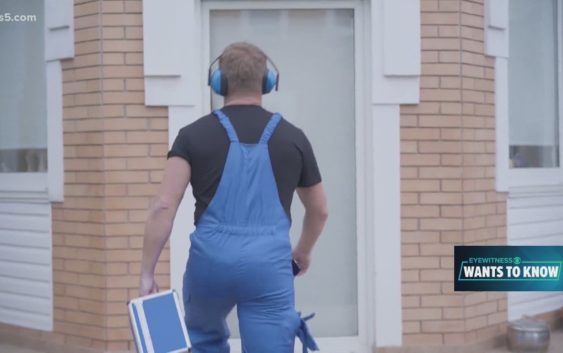- McDowell County wildfire spreads to 500 acres, evacuation orders in place
- Evacuations in Caldwell County due to wildfire
- Northwest Houston 'ghost neighborhood' caused by repeated flooding to become latest detention basin
- NHL playoffs: Hurricanes open playoffs Easter Sunday afternoon vs. Devils
- 2 wildfires spreading in rugged terrain in western North Carolina
How to find a legitimate contractor to repair storm damage

Some people posing as contractors are looking to take your money and leave you without repairs.
SAN ANTONIO, Texas — The snow and ice created complications including plumbing problems, roof damage and electrical issues for many of us. The wait time for a repair person can be lengthy, but maybe worth that wait.
“Scam attempts will be made whether in person, door to door, over the phone or email. They’ll be posing many times as legitimate contractors. They are going to be looking to use an existing company’s reputation and claim that they are FEMA,” said Jason Meza, the regional director of the Better Business Bureau (BBB). “They’re trying to get in the door and to get some kind of payment from you.”
FEMA warns it does not certify contractors. Be cautious also of unsolicited offers for help.
“You’ve got to watch for door to door salespeople,” Meza said. “They are high pressure. Usually arrive right on time. They know exactly what you’re going through.”
See how they ask you to pay. FEMA said you should not wire money or pay with gift cards. Also, never do this:
“Never pay for all repairs in advance,” said Meza. “Do not pay with cash. They want some money to walk away with an agreement in place. They might not ever show up to the repairs.”
Ask for a price in writing and read the contract. FEMA said to make sure the contract details all work to the performed, the costs, a projected completion date, how changes will be negotiated and disputes settled.
“Don’t leave blanks,” Meza said. “We see people all the time leave blanks and the contractor comes in and writes things afterwards and they kind of build the cost back up.”
Verify a contractor is licensed, bonded and insured. Watch out for this tactic: It is illegal for a contractor to offer to waive an insurance deductible on a bid said Meza. Also check the three R’s: Reviews, referrals and reputation. FEMA said to reject any offers that are too good to be true. Be sure to get at least three estimates.
“You want to gauge it upon what the work is, the scope, the timing,” Meza said. “What are they going to charge for overtime after hours?”
Know contractors are required to offer a notice of cancelation if the transaction happens in your home.
“It gives you the chance or right to change your mind within three days,” said Meza.
Do some research yourself to find out what materials are the best and ask the contractor what materials they plan to use for your job.
“Just really learning about the project itself will help you ask the right questions,” said Meza.
You should also document your contractor. FEMA suggested to take a picture of your contractor, their vehicle, license plate and business card.
Ask if their work is guaranteed before you guarantee them any work. FEMA said customers should demand satisfaction and not sign completion papers or make a final payment until the work is done properly.
Report concerns to the BBB and the Texas Office of the Attorney General by 800-621-0508.